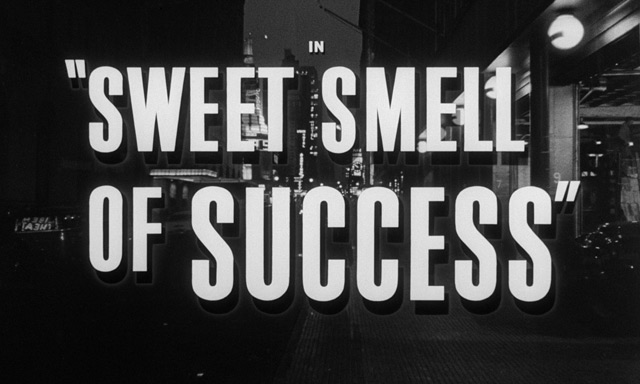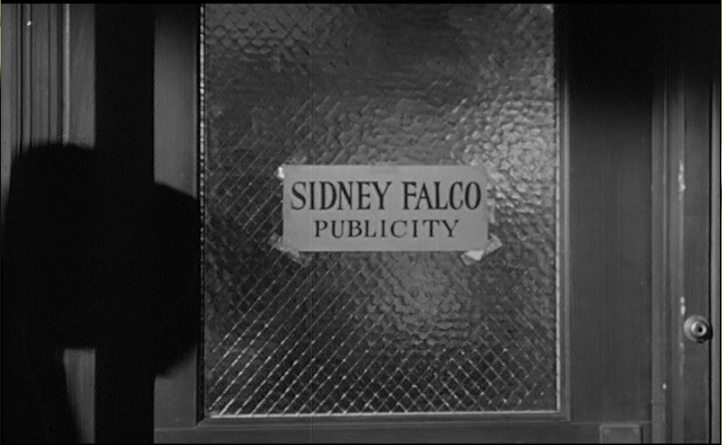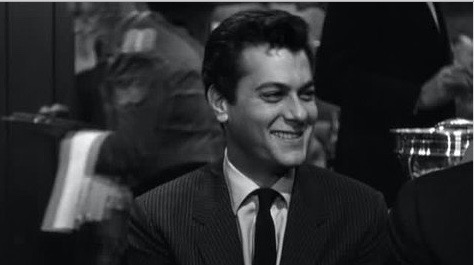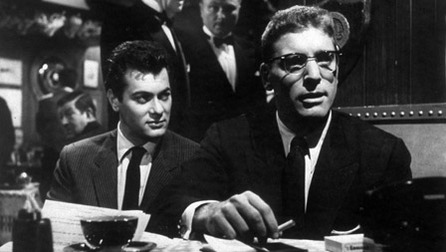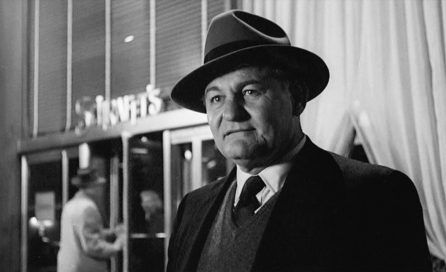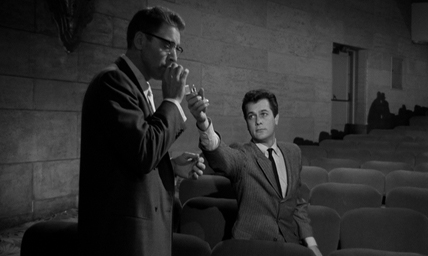We open on New York. Black and white. Shot on location. Night. Some newspaper men are loading up a truck. On the the side of the truck are printed the watchful eyes of JJ Hunsecker, glaring over his city. The score kicks in. It’s rough and brassy. The horns impose themselves over the rest of the music, demanding our attention. Dun-na-a-na-nuu-nuuuu Dun-na-a-na-nuu-nuuuu. Taunting us. Then the titles. Big. They fill the whole screen.
Everything in this movie will be fighting for our attention. Scrambling over the limited real estate. The truck pulls out. The score gets louder. We follow the truck along its route. There’s traffic everywhere, crowds of people, noise. A stack of papers is flung off the truck. Sidney Falco (Tony Curtis) buys one and the camera follows as he squeezes past extras in a crowded diner. He scans the paper, then throws it away in disgust. We follow him down the street, through a door and up the stairs to his office.
Sidney Falco is a desperate man. He walks past his secretary to the back room that doubles as his bedroom. He ducks one call on the way and makes another that loses him a client. His secretary tries to comfort him.
“Sidney, if you feel nervous-”
“So what’ll you do if I feel nervous? Open your meaty sympathetic arms and-”
This movie does not want our sympathy. It is not concerned about providing us with kind, admirable characters. This our hero, he’s morally bankrupt and he’s going to go out and sell whatever’s left of his soul for a few scraps of Hunsecker’s column space. As he heads out his secretary reminds him to take his coat. He scoffs at her.
“What and leave a tip in every hat check room in town?”
The language in this movie is incredibly precise. Look at how efficient this piece of dialogue is. It tells us that Sidney’s broke. Too broke to leave tips. But also that he can’t just not leave a tip. That he needs to keep up appearances. That he’d rather go out into the cold New York night naked than let the world see how desperate he is. And he’s savvy enough to recognize these problems before they occur. He’s a schemer. It also tells us that he’s going to every hat check room in town. It perfectly sets the stakes and tone, and foreshadows the action with one line of dialogue.
The film is directed by Alexander Mackendrick, but you could be forgiven for guessing a time traveling Martin Scorsese. There is an incredible amount of energy to this movie. There’s no dead weight. The narrative is always moving forward. The score is loud, the images beautiful. It’s a masterpiece, decades ahead of it’s time. And like most ahead of their time masterpieces, it was completely rejected when it was released. Audience members were seen “curling up, crossing their arms and legs, recoiling from the screen in disgust.” That’s according to the film’s director. This is a cynical film about cynical characters, and audiences weren’t prepared for it. They weren’t prepared to see likeable movie stars Tony Curtis and Burt Lancaster as morally hollow social leeches. The movie also picked a big enemy in Walter Winchell, the thinly veiled inspiration for JJ Hunsecker.
We leave the apartment and get a little plot. Sidney Falco is a press agent whose career depends on JJ Hunsecker giving him column space. JJ has a sister who is dating a jazz guitarist and is freezing Sidney out until the relationship is broken up. Sidney checks in on the boyfriend, Steve Dallas, and finds Susie accepting his marriage proposal. This is the first time we see Falco in action.
Tony Curtis doesn’t so much perform the dialogue as dance it. He’s always moving. He goes through a dozen emotions a scene. Changes tracks on a dime. Adopts whichever one will get him what he needs. He’s a liar, often a bad one, but he’s persistent. He pushes through the discomfort. He thrives on it. Escalates his theatricality, twists around in it, until the other side relents and gives him what he wants. He’s a character who is motivated by a need for validation but also uses his own humiliation as a weapon. Humiliation is often his first draw.
We get a bit of texture here. Sidney rubs shoulders with a few more people, he makes a date with a cigarette girl and loses another client. He takes Susan home, and then it’s off to see JJ. The movie builds up to Hunsecker’s reveal. Throughout the film people have been talking about him, whispering about him, asking about him. When Falco enters the club he asks, “Is he here?” No need to specify who he is. He is in, and he’s having dinner with a Senator. Falco decides to phone the table before going over.
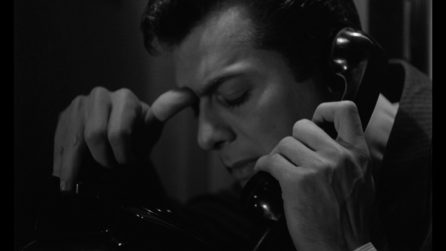
This sort of buildup can backfire. If the character doesn’t live up to the hype, doesn’t immediately command the screen, the film will never recover its credibility. Burt Lancaster is a true movie star, but it’s still a gamble.
Lancaster is an interesting actor. He seems to belong to two eras of filmmaking. He had the theatricality, screen presence, and ego of a golden age star. Even the mannered, slightly over-pronounced Hollywood accent. He was a good man for a soliloquy. But he also had the attention to craft, artistic ambition, and desire for variation that would define the next generation. He was a guy who did his own stunts, back when stunts weren’t discussed in public. He had his own production company, and used it to play complicated, unlikeable characters in commercially questionable projects. His physicality in this film is fantastic. He’s all restraint and control. Every movement is purposeful and planned. He flaunts his inattention, and then lets his focus barrel down on a character. He’s like a shark, all forward momentum and dead eyes. To achieve that hollow stare, Lancaster smeared vaseline on his glasses to prevent his eyes from ever focusing. That sort of thing would be a big deal for a method actor, but it was just an eccentricity in 1957. His ego was such that he demanded that he constantly dominate the screen. The result is that Hunsecker towers over the film like a god. No one even considers defeating him. They only want to escape him. His enemies only to annoy him.
The next scene is an absolute masterclass in filmmaking. Falco goes over to Hunsecker’s table uninvited. He has information that Hunsecker wants and needs to get him alone to tell him, so he’s going to torpedo the dinner. Hunsecker is angry with Sidney. He wants to punish him. He doesn’t have Sidney’s ease with humiliation, but he has an even greater appetite for discomfort. The senator and his guests (a young woman, and a talent agent) are going to be casualties. Every word is a weapon here. Every edit signals a shift in the power dynamics. This is to bitchy gossipy melodrama what the shootout from Heat is to action movies.
Tony Curtis approaches, nervous. He stands behind Lancaster. Supposedly Lancaster didn’t want Tony Curtis to sit down with him because it would imply they were movie stars on equal footing. That’s the sort of thing that would be praised for being deep in character today, but was seen as being a hard-to-work-with asshole back in the 50s. Six of one, I say. The camera is at a low angle, so that even though Lancaster is sitting he still looms over Curtis. Hunsecker senses Sidney approach and says to the Senator, not to Sidney,
“Harvey, I often wish I were deaf and wore a hearing aid…with a simple flick of a switch I could shut out the greedy murmur of little men…”
No worries about Hunsecker not living up to the hype. Falco ignores the comment and asks JJ for two minutes. Hunsecker calls the maitre-d’, by name, to throw Falco out. Falco, quietly
“I have a message from your sister”
We cut to a high angle on Lancaster. His body language changes. He turns back to face his audience. They are along one side of the table and Hunsecker has the other side to himself. Falco stares down the maitre-d’, who reads the scene and leaves. Hunsecker, still ignoring Sidney, tells the senator to continue and Falco takes a seat, not quite at the table but behind Lancaster, so that he looks smaller than him and is constantly peering over his shoulder. We watch from behind Falco as he brings himself into the conversation. There’s some small talk and Hunsecker begins to vent his frustration on his audience. Falco addresses the audience but is really needling Hunsecker. Hunsecker gets more frustrated and starts digging into his guests, hinting at an affair between the girl and the senator. The senator turns the attention back to Falco, asking if he’s an actor. The woman jumps on this, eager to get out from the spotlight. Hunsecker lights up at the opportunity to rake Sidney over the coals a bit.
“How did you guess it, Miss James?”
“He’s so pretty.”
There’s some more of the film’s linguistic precision. This gives Hunsecker the opportunity to launch into one of the better speeches of the movie.
“Mr. Falco, let it be said at once, is a man of forty faces, not one, none too pretty and all deceptive. See that grin? It’s the charming street urchin’s face. It’s part of his “helpless” act – he throws himself on your mercy. I skip the pleading nervous bit that sometimes blends over into bluster. The moist grateful eye is a favorite face with him – it frequently ties in with the act of boyish candor: he’s talking straight from the heart, get it? He’s got about half-a-dozen faces for the ladies, but the real cut one to me is the quick dependable chap – nothing he won’t do for you in a pinch. At least, so he says. Tonight Mr. Falco, whom I did not invite to sit at this table, is about to show in his last and most pitiful role: pale face with tongue hanging out. In brief, gentlemen and Jersey Lilly, the boy sitting with us is a hungry press agent and fully up the all the tricks of his very slimy trade! Match me, Sidney.”
“Not just this moment JJ.”
Sidney is usually fine being a punching bag for Hunsecker’s theatrics, but he still needs Hunsecker to unravel some more, so he withholds. An agent walks by asking Hunsecker for a favor and Hunsecker short–temperedly brushes him off. The senator, who is no fool, wants to keep the focus on Sidney, so he asks another question about being a press agent. Sidney turns this into criticism of columnists, prompting JJ to lash out at him again. The camera shifts and now JJ and Sidney are on an even plane. Hunsecker is losing control. The agent tries to flatter Hunsecker and he turns his rage onto him.
“Look, Manny, you rode in here on the Senator’s shirt tails, so shut your mouth!”
The senator interjects. And Hunsecker slips back into control. The camera moves closer between cuts so that Tony Curtis is no longer in frame. Hunsecker bares his focus down on the senator, his voice is calm, soothing even, but clearly threatening. And then we get a very famous beautiful little shot over Lancaster’s back as the camera pans from “this one” (the agent) who’s “toting that one” (the girl) “for you” (the senator). In the script it says Hunsecker points to each person as the camera pans to them, but Hunsecker doesn’t point. Hunsecker looks, and the world pays attention to what he is looking at. The senator is shell shocked, but Hunsecker is satisfied and gets up from the table with Sidney. He’s in a better mood now, chummy with Sidney, friendly with the coat check guy and the maitre-d’. JJ lives for the power. Not as a means to anything, but the power in and of itself. He wants to tell a Senator off and have the senator thank him for it, and now that he’s coasting on that high Sidney will be able to reason with him. We’ve also gotten through all the important exposition about what press agents and columnists do, because that is how you deliver exposition in a movie.
Outside Sidney and Hunsecker go to talk to JJ’s fat cop friend. This may be my favorite cop in movies. Look at this beautiful face.
Lt Kello is vulgar, abrasive, and cruel. He’s not a sophisticate like Hunsecker, but he’s part of the same breed, and every bit as dangerous. Falco doesn’t get within arms’ reach of him, and even Hunsecker feels the need to remind him that Kello owes him a favor. He also gets some of the best lines in the movie. He calls Sidney “the boy with the ice cream face” and when Hunsecker tells him that’s apt, he responds,
“Yeah, I got eyes, I puts things together.”
He’s got a big crocodile grin, an easy cheerful sadism, and Hunsecker’s gift for making friendly conversation feel threatening.
Hunsecker asks about police gossip and checks on a woman who fell from roof that he’s considering for a story
“She died twenty minutes ago, Mr. Hunsecker.”
“Well, that’s show business.”
A commotion breaks out down the street. Some drunk getting tossed out of a strip club.
Hunsecker: I love this dirty town.
Sidney and Hunsecker walk down the street. Hunsecker’s limo drives next to them. Sidney tells JJ the news and gets a reprieve. JJ enters the limo and asks him if he can deliver.
“Tonight. Before you go to bed. The cat’s in the bag and the bag’s in the river.”
Hunsecker drives off, spraying Sidney with grime, the horns kick back on the soundtrack and Sidney’s off to another club.
He’s going to plant a smear on Steve Dallas in another paper. To do that he’s going to blackmail the columnist who’d been trying to sleep with the cigarette girl from earlier. Remember when I said we were building texture? Well, this movie is 96 minutes long, so that is load–bearing texture. This whole plan blows up in Sidney’s face, the columnist confesses to his wife, who is almost proud of the man, and then gives Falco a dressing down. One of the ways to make an unlikable character compelling is to make them suffer. Falco gets put through the ringer. Everybody, and I mean everybody, is willing to tell this guy exactly what they think of him. Sidney never really argues with any of it. In this case it’s that he has “the morals of a guinea pig and the scruples of a gangster!” For his part Sidney isn’t biting. “What do I do now? “ he asks. “Whistle ‘Stars and Stripes Forever?”
That plan is blown, but in New York City there’s always a dirtier scumbag and Sidney doesn’t even have to leave the club before he’s found a columnist eager for a piece of slander. This time he pitches it as a bit of revenge against Hunsecker, even borrowing the “morals of a guinea pig and the scruples of a gangster!” line from a moment ago. That’s not quite enough, so he also agrees to pimp out the cigarette girl who’s waiting for him in his bedroom. It’s as disgusting and despicable an act as anything in the film. Sidney badgers the woman into prostituting herself, all while playing it off like he’s doing her a favor and he’s the one with hurt feelings. She agrees, and Sidney is positively giddy. The thing is done, and for the rest of the movie he can sit back and watch the gears of society do the work.
With the pressure off we get to see Sidney hustle a bit. He calls JJ to give him the news and get a piece placed in the column. Then he goes by the paper, sweet talks the secretary in order to read the early print, and uses that information to go hook a new client. Sidney talks to Steve (who has already been fired) and JJ talks to his sister.
It’s noteworthy that Susan is JJ’s sister and not his daughter. Susan Harrison was young enough to be Lancaster’s daughter and his relationship with her is more paternal than brotherly. But for JJ to have a daughter he would first have to have a wife, and to have a wife he would first need to have some human emotion – if not love, then at least lust, and Hunsecker is above such petty carnal concerns. Hunsecker doesn’t need anything. The only thing he wants is power and he already has all of it. In any other story his preoccupation with his sister would read as insestuous, but not here. He sees her as an extension of himself, and expects her to behave as an extension of himself. He expects her to sit alone in her room overlooking her half of the city, while he sits alone in his room overlooking his half. He can’t understand why she keeps going out and fraternizing with the mortals.
JJ gets Steve his job back, but wants to meet him. All Steve needs to do now is show up, smile, and grovel a bit. But he can’t do it, because he’s a sap. JJ’s not concerned about Susan’s well being, but he’s not wrong when he says she’s too good for him. Steve is dumb. He’s always going around saying exactly what’s on his mind and then getting blindsided by the consequences. My personal hunch is that Susie really likes him because the name Dallas seems far away from New York. Susan’s reaction here is interesting. She recognizes what JJ and Sidney are doing, but gives in nonetheless. If your boyfriend can’t be polite around your family for five minutes…
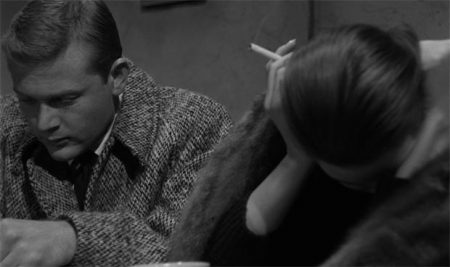
Susie is not dumb. She’s not manipulative, but she’s not dumb either. She understands what motivates people every bit as much as Sidney and JJ. Earlier in the film she questions if her brother is putting on an act about Steve, and Sidney protests,
“Why should he put on an act for him? JJ’s told presidents where to go and what to do.”
“The act would be for my sake.”
The line isn’t arrogant, it’s accurate. Susan knows what she means to people, to her brother. In her scenes with Sidney she has a sort of bored amusement, like a princess playing with the court jester. She is neither taken in by his lies, nor offended by them. She’s too far above him to take any of it personally. She’s far above Steve too, and the relationship was doomed even before the meddling.
JJ has won. He’s gotten everything he wants. But he can’t abide allowing a mosquito like Dallas insult him, so he tells Sidney to get Kello.
“J.J., I swear to you on my mother’s life, I won’t do it! If you gave me a column I wouldn’t do a thing …”
It’s a lie, and they both know as soon as he says it. Sidney’s named his price. He gets Kello, and Steve gets his.
With Steve in the hospital, Sidney gets a call from JJ to meet him at his penthouse. When he gets there, there is only Susan, in a nightgown on her bed. She threatens to kill herself a makes a mad dash for the balcony. Sidney grabs her and wrestles her back to the bed, just as JJ enters. He sees Sidney with his sister and is enraged. He slaps him around the room, Lancaster finally tapping into his hulking physicality. Sidney pleads for Susie to tell Hunsecker the truth. She says nothing. Sidney realizes what’s happening.
“You’re growing up? Cute.”
He flees the apartment as Hunsecker calls Kello. Susie leaves alone to face the morning.
If this isn’t the greatest film noir ever made it’ll do until it gets here. The smart, desperate, morally compromised hero. The utter and total corruption of the city and everyone in it. The score, dangerous and evocative. The beautiful expressionistic cinematography. The constant suggestion of deeper evils. The whole film is soaked in cruelty and existential despair. And that script.
The story was based on an article by Ernest Lehman which he later expanded into a novella and then a screenplay. It was rewritten by Mackendrick to make it more cinematic before Clifford Odets (inspiration for Barton Fink) was brought in to punch up the dialogue. He was given a month, and took four, sometimes turning in scenes mere hours before they were shot. If he had been given six, he’d have invented a whole new language. The dialogue here is incredible. I spent hours poring over the script, searching for quotes I could leave out. I feel I’ve shown an uncommon level of restraint, but there are some things I won’t leave unsaid.
“Watch me run a 50-yard dash with my legs cut off!”
“Starting today you can play marbles with his eyeballs.”
“You’re a cookie full of arsenic.”
“Come back, Sidney… I wanna chastise you…”
“It’s a dirty job, but I pay clean money for it.”
“Son, I don’t relish shooting a mosquito with an elephant gun, so why don’t you just shuffle along?”
“Tell me sir, when he dies, do you think he’ll go to the dog and cat heaven?”
“You sound happy, Sidney. Why should you be happy when I’m not?”
“I like Harry, but I can’t deny he sweats a little.”
“Integrity – acute, like indigestion.”
This movie is poetry.


